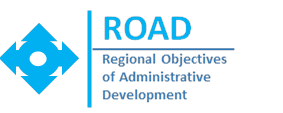You may also consult the AEPQ’s International Projects that have been concluded.
Ongoing Projects
ROAD – Regional Objectives of Administrative Development
The Overall aim of ROAD project is to enhance local development strategy of Kyrgyz and Turkmen civil servants through improving their competencies by creating a f2f and virtual training and counselling campus and recommendations for sustainable development, in particular to carry out a competency training framework for local civil servants, to create training and counselling centers, to train local civil servants in local development trends, to create guidelines and recommendations for local development strategy and to create and implement an online virtual Campus.
The Project is funded under the Erasmus+ KA2 – Cooperation for innovation and the exchange of good practices: Capacity Building in Higher Education (574243-EPP-1-2016-1-PT-EPPKA2-CBHE-JP), coordinated by Técnico Lisboa in partnership with Issykkul State University Named After K.Tynystanov, Ishenaly Arabaev Kyrgyz State University, Jalal-Abad State University, Capacity Building Consulting Group, International University For The Humanities And Development, Turkmen State Institute Of Finance, Universitat Politecnica De Catalunya, Universitat Rovira I Virgili, Escola D’administració Pública De Catalunya, Universidad De Las Palmas De Gran Canaria, and Kungliga Tekniska Hoegskolan.
Duration: Oct 2016 – Oct 2019
Links and Documents
MIND – Management Innovation and Development
The project aims to strengthen capacity building by establishing Career Centers at the HEI, to assist students, graduates and postgraduates in establishing and operating start-ups and creating (jobs at) innovative small and medium-sized enterprises. The project is funded under the Erasmus+ Capacity Building in higher Education program (EU (561359-EPP-1-2015-1-ES-EPPKA2-CBHE-JP)) with the following partners: ULPGC; KNU; CBC; OshTU; Ministry of Education of the Kyrgyz Republic; TUIT; BUXDU; SAU; Ministry of Education of Uzbekistan; UPC; UNIGE.
Duration: Feb 2016 – Feb 2018
Links and Documents
REDEEM Project
The REDEEM project is funded with the support of Erasmus+ Strategic Partnerships and aims to measure the impact of double degree-studies for the students and what lessons can we learn from the stakeholders to become better in developing international programmes in the future. (Website)
The project aims at:
- Providing tools to reform the existing Double Degree Programmes and create new ones in the light of a better understanding of what works and what doesn’t work in terms of structure, mandatory and optional activities, employability, student and employer expectations and perceptions, national and scientific field specific differences, etc.
- Improving the attractiveness of the reformed/newly created programmes both from the students and the employers perspective
- Enhancing higher employability and satisfaction rates of the STEM graduates participating in these programmes
- Boosting the internationalization and recruitment strategies at the Higher Education Institutions that will implement the final recommendations.
FOLLOW Project
The FOLLOW project is the joint effort of 4 cluster universities with the main goal of identifying and disseminating the best and most effective practices concerning the monitoring and promotion of HE graduates employability and channeling them into objective and effective improvements on the local and European policies that deal with this subject.The project originated from IST Portugal, one of the first HEI in Portugal to steer resources to address the issues of employability of its graduates and to be aware of the importance of these matters in the strategic management of HEI. (Website)
- FOLLOW Project Final Report (PDF, 4.7MB), 2013
- FOLLOW Project WP1 Report (PDF, 657KB), 2013
- FOLLOW Project WP2 Report (PDF, 1.8MB), 2013
ATTRACT Project
The Attract project examines the recruitment strategies of students to engineering sciences and how the retention of students can be improved at an international European level. Attract brings together seven CLUSTER (Consortium Linking Universities of Science and Technology for Education and Research) universities and additionally two Swedish universities which have been involved in the original national project in Sweden. (Website)


